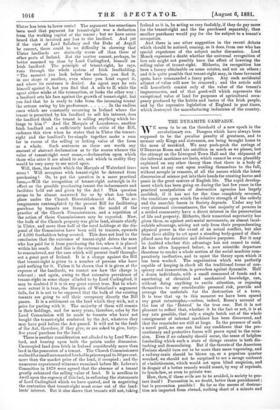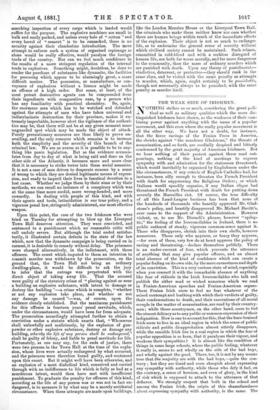THE DYNAMITE CAMPAIGN.
WE seem to be on the threshold of a new epoch in the revolutionary era. Dangers which have always been supposed to be the peculiar penalty of greatness, and to menace only Kings and statesmen, are being brought home to the mass of mankind. We may pooh-pooh the ravings of O'Donovan Rossa and his satellites as much as we please, but the attempt on the Liverpool Town Hall and the shipment of the infernal machines are facts, which cannot be even plausibly explained on any other theory than that there is a body of men bent at any cost upon availing themselves to the full, without scruple or remorse, of all the means which the latest discoveries of science put into their hands for creating havoc and panic in the great centres of English life. The rapid develop- ment which has been going on during the last few years in the practical manipulation of destructive agencies has largely modified, if it has not for the time completely reversed, the conditions upon which the relative strength of the orderly and the anarchic forces in Society depends. Under any but very abnormal circumstances, the vast majority of persons in a settled community have a direct interest in the preservation of life and property. Hitherto, their numerical superiority has given them, as against anti-social movements, an almost incal- culable advantage, arising not only from their preponderating physical power in the event of an actual conflict, but also from their ability to set apart a standing body-guard of disci- plined men for detective and defensive purposes. But it may be doubted whether this advantage has not ceased to exist. As has often happened before, a new scientific departure threatens to render a whole section of the social machine com- paratively ineffective, and to upset the theory upon which it has been worked. The organisation which was perfectly capable of keeping in check all the traditional forms of con- spiracy and insurrection, is powerless against dynamite. Half a dozen individuals, with a small command of funds and a smattering of chemical and mechanical knowledge, can, without doing anything to excite attention, or exposing themselves to any considerable personal risk, provide and arrange the materials for the destruction of a town. It is true that up to this moment we have been spared any great catastrophe,—unless, indeed, Rossa's account of the loss of the 'Doterel ' be the true one. But it is not pleasant to reflect that, whether it be the fact or not, it is at any rate possible, that only a single batch out of the whole consignment of infernal machines has been discovered, and that the remainder are still at large. In the presence of such a novel peril, no one can feel any confidence that the pre- cautionary and protective forces will prove equal to the occa- sion. Even if no calamity should occur, the sense of helpless foreboding which such a . state of things creates is both dis- turbing and demoralising. But if the threats of the American Fenians should turn out to be more than mere vapouring, and a railway-train should be blown up, or a populous quarter wrecked, we should not be surprised to see a savage outburst of vindictiveness, which would act upon blind suspicion, and in despair of a better remedy would resort, by way of reprisals, to lynch-law, or even to private war.
How, then, if these evils are to be avoided, is society to pro- tect itself ? Prevention is, no doubt, better than punishment ; but is prevention possible ? So far as the means of destruc- tion are imported from abroad, nothing short of a minute and searching inspection of every cargo which is landed would suffice for the purpose. The explosive machines are small in bulk and easily packed, and unless every bale of " cotton " and every barrel of " cement " is to be ransacked, there is no security against their clandestine introduction. The mere attempt to enforce such a system of organised espionage as alone would be really effective, would paralyse the foreign trade of the country. Nor can we feel much confidence in the results of a more stringent regulation of the internal trade in explosives. Something might, doubtless, be done to render the purchase of substances like dynamite, the facilities for procuring which appear to be alarmingly great, a more difficult matter. The possession, or manufacture, or con- veyance of explosives without a licence might be made an offence of a high order. But some, at least, of the most potent destructive agents can be compounded from their ingredients with comparative ease, by a person who has any familiarity with practical chemistry. So, again, the enormous area which has to be watched and defended against the attempts of men who have taken universal and indiscriminate destruction for their province, makes it ex- tremely improbable, however alert the vigilance of the authori- ties may be, that there will not be at any given moment some unguarded spot which may be made the object of attack. Purely precautionary measures are thus likely to prove un- availing, and the only resource which remains is to increase both the simplicity and the severity of this branch of the criminal law. We are as averse as it is possible to be to any- thing like panic legislation. But as the evidence accumu- lates from day to day of what is being said and done on the other side of the Atlantic, it becomes more and more clear that it is necessary to strike terror into these social assassins. It is not a case of men driven to desperate courses by a sense of wrong to which they are denied legitimate means of expres- sion, and ready to imperil their lives in fanatical devotion to a lost cause. Whether we judge them by their aims or by their methods, we can recall no instance of a conspiracy which was at the same time more sordid, more wrong-headed, and more cowardly. In dealing with people of this kind, and with their agents and tools, intimidation is our true policy, and a vigorous penal law, stringently administered, our most effective weapon.
Upon this point, the case of the two Irishmen who were tried on Tuesday for attempting to blow up the Liverpool Town Hall deserves attention. They were convicted, and sentenced to a punishment which no reasonable critic will call unduly severe. But although the trial ended satisfac- torily, it illustrated certain defects in the state of the law which, now that the dynamite campaign is being carried on in earnest, it is desirable to remedy without delay. The prisoners were charged alternatively, in the indictment, with three offences. The count which imputed to them an intention to commit murder was withdrawn by the prosecution, on the ground that, the Town Hall not being an ordinary dwelling-place, it would be difficult to ask the jury to infer that the outrage was perpetrated with the direct object of taking away life. That the accused were guilty of the statutory crime of " placing against or near a building an explosive substance, with intent to damage or destroy the building "—a crime which is complete, " whether or not any explosion take place, and whether or not any damage be caused "—was, of course, upon the evidence clearly established. But the maximum punishment for this offence is fourteen years' penal servitude, which, under the circumstances, would have been far from adequate. The prosecution accordingly attempted further to obtain a conviction under a statute which enacts that, " Whosoever shall unlawfully and maliciously, by the explosion of gun- powder or other explosive substance, destroy or damage any building, whereby the life of any person shall be endangered," shall be guilty of felony, and liable to penal servitude for life. Fortunately, as one may say, for the ends of justice, there were two persons in the Town Hall at the time of the explo- sion, whose lives were actually endangered by what occurred, and the-prisoners were therefore found guilty, and sentenced upon this count. But it might well have been otherwise, and an explosion of a most diabolical kind, conceived and carried through with an indifference to life which is fully as bad as a murderous intent, would then have met with insufficient punishment. To graduate the penalty for offences of this kind, according as the life of any person was or was not in fact en- dangered, is to measure it by what may be a merely accidental circumstance. When these attempts are made upon buildings, like the London Mansion House or the Liverpool Town Hall, the criminals who make them neither know nor care whether there are human beings within reach of the immediate effects of the explosion. Their object is not so much to endanger life, as to undermine the general sense of security without which civilised society cannot be maintained. Such crimes, committed in cold-blood and with a reckless disregard of human life, are both far worse morally, and far more dangerous to the community, than the mass of ordinary murders which are punished with death. Upon any theory of punishment— vindictive, deterrent, or protective—they should rank in the same class, and be visited with the same penalty as attempts to murder, which, again, ought certainly to be punishable, though not necessarily always to be punished, with the same penalty as murder itself.































 Previous page
Previous page